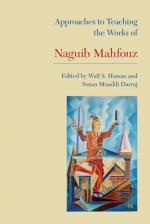|
This section contains 8,735 words (approx. 30 pages at 300 words per page) |

|
SOURCE: Elad, Ami. “Mahfuz's ‘Za‘balāwī’: Six Stations of a Quest.” International Journal of Middle East Studies 26, no. 4 (November 1994): 631-44.
In the following essay, Elad contends that Mahfouz utilizes mythic themes, Egyptian cultural elements, motifs from the work of Franz Kafka and Albert Camus, and Islamic ideology to illustrate the “dilemma modernity poses for Egyptian society” in “Zabalawi.”
The writings of the Egyptian novelist Najib Mahfuz1 (b. 1911) in the 1960s illustrate the new literary trends that were then emerging in Arabic fiction. Among his works, the volume of short stories, Dunyā Allāh (God's World, 1963), was the first and perhaps the most important collection within the corpus of his creative works. These short stories are striking for the themes they pursue and the poetic universe they depict, and they reveal in particular his and the Egyptian reaction to progress. In this essay only one of these short...
|
This section contains 8,735 words (approx. 30 pages at 300 words per page) |

|


